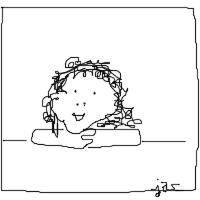After reading an essay written by Jeanette Winterson in which she defends Gertrude Stein’s The Autobiography of Alice B. Toklas (in Winterson’s book, Art Objects, Essays in Ecstasy and Effrontery), I got curious about the book, and have been reading it myself. Winterson wrote that those criticizing Stein as being self-aggrandizing and not factual had missed the point of what she was doing. Winterson’s view is that Stein was no more intending to write a factual book than Matisse or Picasso were trying to paint photographic portraits, that the book was meant to be a work of fiction, was experimenting with an entirely new form, and should be judged on its experimentation–producing a new way of seeing and thinking–rather than on its substance. That may be. Nevertheless, I think a work should provide some substance as well.
The main thing I admire about The Autobiography of Alice B. Toklas, is Gertrude Stein’s chutzpah. Alice’s “autobiography” is actually a biography of Gertrude; thus, actually an autobiography by Gertrude. A literary trompe d’oeil in which Stein can have Toklas dub Stein one of only “three first class geniuses” she has known, and in which “Alice” writes next to nothing of her own life. A clever little con-artist, our Gertie.
My problem with the book, beyond the self-aggrandizement, is that it appears to be a rather constant recitation of the famous artists and writers, composers, or philosophers with whom Stein mixed in Paris, along with a stream of blanket statements about who got along with whom and who didn’t. But one never is given any details that would make the content more than name-dropping or very general, minimal gossip.
For example, Stein-alias-Alice tells us that Stein liked William James and that he thought highly of her and recommended she go to medical school and become a psychologist. But she does not tell us anything of what they may have discussed about philosophy or psychology–or even what her own views were. She tells us only that, when she got to medical school, at a certain point she didn’t do the work because she was “bored,” yet many professors passed her anyway because of her presumed “brilliance.”
Stein-aka-Alice writes that Stein talked with the geniuses or near-geniuses, but that she–Alice–only talked with the wives of the geniuses or near geniuses. Not only does she give us no details or insight into the “geniuses,” she tells us nothing about the wives except that they were congenial or not, fashionable or not, etc. Perhaps this is because the real author, Gertrude, never talked to the wives. But, then, neither as Alice nor as herself does she provide any depth–real or fictional–to her view of any of the people beyond the fact that they kept coming and going, and she saw them often or saw them rarely, or met them once, or saw them often but fell out with them (she never gives us the reasons).
Of Picasso (or Matisse or Hemingway, or others), she may tell us that they discussed or argued at length–with Picasso, long into the night–but never tells us what they discussed or what either thought. Instead of giving us a real (or even fictional) sense of Stein’s life or her thinking, the book leaves one with the impression that this person was a pseudo-intellectual who lived a shallow, if idiosyncratic, life–and an easy one (whenever there was a question of money, it seemed that all Stein had to do was call a relative in America and money–or on one occasion, even a Ford automobile–would be sent).
Stein’s experiments with literary form may have value. Her other works (poetry, novellas, novels, plays, etc.) may have something to them, but one cannot get any real insight into them or her from this book. Stein’s notions as expressed in this book remind me of no-one so much as Christopher Isherwood’s peripatetic Sally Bowles. And Stein’s very definite declarations of literary and artistic “truths,” to the degree that they’re expressed here, make me think of Muriel Spark’s Miss Jean Brodie, who fancies herself artistic, radical, and a sophisticated shaper of the thoughts of the little girls she teaches, but is actually just an admirer and adherent of fascism. Although The Autobiography of Alice B. Toklas has nothing in it that addresses Stein’s political philosophy, there is something about it that leaves me unsurprised to find that she was an adherent of Vichy France and its leaders.
I am inclined, as relates to The Autobiography of Alice B. Toklas, to quote Hemingway: “A rose is a rose is an onion.”

